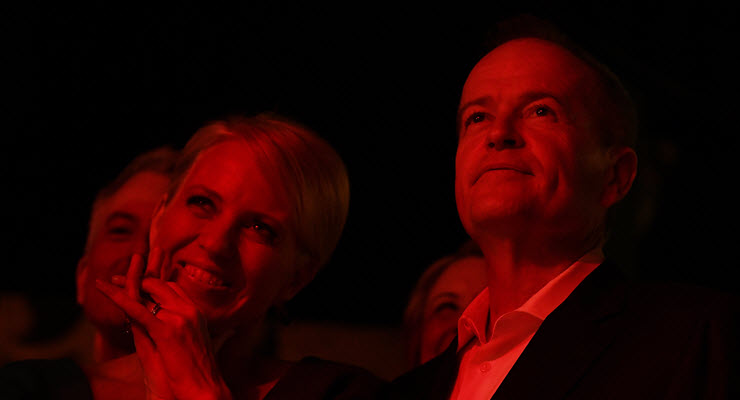
Labor feels at home when it comes to arts policy, perhaps as in few other policy areas. Of course, it helps that the Coalition hasn’t even bothered to put out a cultural policy. But the ALP can justifiably point to a proud history in the portfolio, from Whitlam to Keating to the Rudd-Gillard years, when Labor left office with a promising but unfulfilled Creative Australia policy.
Rebooting Creative Australia was the theme of Saturday’s launch at The Espy in St Kilda. The famous rock venue in the marginal seat of Macnamara has been renovated and gentrified but, even so, the scent of sweaty nights lingers.
The grungy vibe carried over to Labor’s launch. There were few suits and plenty of T-shirts and jeans. Arriving dignitaries wandered in past a bemused crew of Saturday drinkers, some of whom whipped out their phones and took selfies with the Bananas in Pyjamas. Chloe Shorten was comfortably the best dressed person in the venue.
While it wasn’t exactly a gala event, a good cross-section of Australia’s arts leaders were present. Rhys Muldoon, Marta Dusseldorp, Paul Grabowsky and Thomas Keneally mingled with the likes of Tony Burke, Mark Dreyfus, Simon Crean and Tim Watts. Speeches by Burke and Bill Shorten alternated with songs by musicians David Bridie and Owl Eyes.

Labor’s arts spokesperson Tony Burke played master of ceremonies, introducing the talent and keeping his own remarks short and upbeat. After running through a long list of Australian artists and their cultural achievements, Burke asked the audience to “imagine what the next few years could hold”. He pledged that a Shorten government will put “cultural policy back in the centre of decision making”.
That remains to be seen, but there is no doubt that Labor under Bill Shorten identifies strongly with culture, and will back it. An impressive $319 million has been pledged to a suite of cultural promises.
Labor will create a new national Indigenous theatre and fast-track Melbourne’s Ilbijerri Theatre Company to major performing arts status. There is a permanent $12.5 million a year funding increase to the Australia Council’s base funding, $39 million for music industry programs, an extra $1 million for regional arts, $2.3 million for arts training institutions, funding for multicultural arts, and a commitment to force arts companies to develop better policies for paying artists.
There’s also an uncosted but welcome commitment to improving safety in industries notorious for sexual harassment and workplace mental health issues. The Interactive Games Fund killed off by Tony Abbott will also be revived.

It’s not quite champagne all round. Labor’s policy is not the transformation some in the sector have hoped for. There is nothing concrete in the policy regarding local content quotas for technology platforms, which is a critical emerging issue. The hard-pressed national collection institutions like the National Gallery, Library and Museum have also been ignored.
But art is also about symbolism, and Labor delivered on symbolism in spades. Shorten gave the keynote speech, and it was a strong endorsement of the value of the arts and of Labor’s belief in what he called “the centrality” of culture in a future Labor government.
Shorten’s speech was one of his best, at least the best of which this correspondent has seen. Starting with a joke about an appearance at The Espy, Shorten warmed to the task, professing his love for the arts and culture, linking his commitment to culture to Labor’s overarching theme of fairness.
“For me, arts policy is not an add on,” Shorten argued. “It’s not something which you do as an afterthought or a footnote to other matters.
“For a Labor government, if you choose to vote for us, we put our story of our arts at the centre of what we do as a nation. The arts is a political issue, the arts does deserve attention and support, the arts does deserve to have a government at least as brave and at least as creative as our own Australian artists and that’s what we will give you next Saturday if you vote Labor.”
There were cheers as he exited, stage-left, accompanied by Chloe and pursued by camera crews. He was followed by short set from art-pop artist Owl Eyes.
But the show was stolen by novelist Thomas Keneally, who delivered a wry and telling final speech. Recalling a conversation he’d had with Gough Whitlam, in which the Labor icon had called him “maestro”, Keneally pointed out that a bit of federal investment was likely to be amply returned in growing sales figures and higher taxes. He then rattled off a series of bon mots against economist Milton Friedman. It was a tour de force in raconteurship.
Unsurprisingly, the arts sector has greeted Labor’s policy warmly. The nation’s major performing arts lobby (AMPAG) and the National Association for the Visual Arts, to name a few groups, have praised the commitments as a welcome first step.
Feral Arts’ Norm Horton and Sarah Moynihan told Crikey that “with the LNP once again deafeningly silent on the arts policy front, renewing Creative Australia is like CPR for a sector that has been on life support for the last six years”.
Labor has also committed to establishing a roundtable on the creative economy; a move which points the way to an intriguing future policy frontier. It might not seem significant at first glance, and has no money attached to it, but it’s possibly the more important commitment of the entire policy. The ALP recognises that Australia lags a long way behind in online content and cultural production. One Labor insider that Crikey spoke with argued that future internet and communications policy needed a much greater commitment to content industries. Doing that will need much larger investments than the token sums sprinkled on the Australia Council and ABC in this policy.
Of course, cultural policy won’t swing the election. It probably won’t even swing Macnamara. But it will play a symbolically important role in a Shorten government. Maybe Labor needs to believe in culture — in a bigger idea of what the ALP stands for, and as a link to the glory days of Whitlam and Keating. We may find out what that looks like in a week’s time.








Local content quotas for technology platforms is a pipedream time-warp from the 1970s, and will never happen. The government has zero control over what comes in from offshore by way of streaming services, and the idea that Netflix et al would (even if they could) abide by some kind of artificial local quota for their Australian audiences is beyond nonsensical. That bird has flown Ben.
Brendon Nelson’s wonderland War Memorial development needs to be knocked on the head and the National Archive and Library supported.
And Brendan Nelson himself
Lols! Nice one Hammy!
Shorten should promise never to call the ABC chair about programming biases.
Government patronage of the yartz inevitably produces pabulum and becomes a fig leaf for censorship.
If an artist ain’t starving in a garret they ain’t serious.